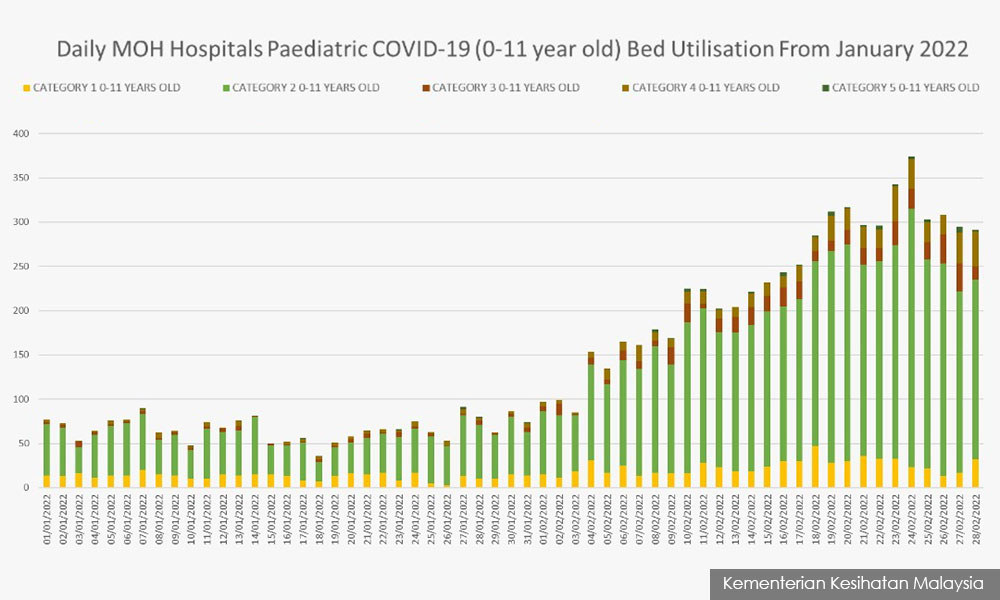COVID-19 | Health Minister Khairy Jamaluddin has once again appealed to parents of young children to come forward to get their children vaccinated against Covid-19.
He said only 30 percent of children aged 5 to 11 years old have received at least one dose of the vaccine, which is far below the ministry’s target. Meanwhile, the number of children being admitted into the paediatric intensive care unit (PICU) is on the rise.
“As I’ve said earlier, I’m saddened that the vaccination rate for children aged 5 to 11 is just over 30 percent. Even as cases, hospitalisations and PICU admissions increase, parents are still not making the choice to protect their children through the child vaccination campaign (NIPKids).
“I think the time to wait-and-see is over. We started NIPKids over a month ago and we have seen that vaccinations are safe and can protect against the worst symptoms, namely hospitalisation, ICU admission, and death.
“Again, I appeal to parents not to dither. Bring your children and get vaccinated under NIPKids,” he told a press conference at the Parliament building today.
The press conference was also live-streamed online.
According to Khairy, 50,826 children below 12 years old have been infected with Covid-19 from early January to mid-February, and another 68,893 from mid-February to March. This brings to a total of 119,719 cases.
This includes a 94 percent increase in PICU admissions, the minister said.

Khairy said children are susceptible to developing Multi-System Inflammatory Syndrome in Children (MIS-C) due to Covid-19 infection.
From June 2020 to December 2021, 174 such cases linked to Covid-19 have been recorded among children below 18 years old, including seven deaths.
Children may also develop Long-Covid after the acute phase of the infection has passed.
“Although the available data is limited, this is a high risk that can be reduced. Long Covid can be reduced through vaccination because it reduces the severity of the Covid-19 symptoms,” he said.
“Limited data obtained so far shows that this risk (of Long Covid) is lower than those of adults, but not much is known at the moment about Long-Covid’s long-term effects on children,” he said.
He said children are particularly vulnerable during the current Omicron wave because most of them are still immunologically naïve to Covid-19 due to the low vaccination rate, especially compared to the vaccination rate among adults.
Moreover, natural immunity is also mostly absent among children because they were largely insulated from previous Covid-19 waves due to school closures.
The risk is even higher for children who have pre-existing conditions such as chronic heart or lung diseases, cancer, asthma, obesity, immunocompromised, or undergoing treatments using steroids such as for autoimmune diseases and transplants.
“In addition, Omicron can cause other symptoms such as diarrhoea, vomiting, dehydration, and febrile convulsions, even if the Covid-19 infection is categorised as low severity.
“The Omicron variant can also exacerbate pre-existing illnesses. For example, children with asthma will have severe shortness of breath even if their Covid-19 infection is categorised as low severity,” he said.
When asked about children below the age of five, for whom no Covid-19 vaccine has been approved so far, Khairy said he hopes there will be evidence from clinical trials in the future showing vaccines to be protective for this age group.
In the meantime, he said parents would have to resort to other means such as masking and physical distancing to protect their children, though he acknowledged that some children are too young to wear a mask properly.
“Perhaps five-year-olds could wear a kid’s mask, but those younger than that may be unsuited to that. So, we really have to protect them.
“Parents would have to think before bringing children below five years old to crowded or public places and so on. This is more towards public health measures that need to be implemented for this group,” he said.
Malaysia has approved Sinovac’s Covid-19 vaccine and a low-dose version of Pfizer’s Covid-19 vaccine for children aged 5 to 11.
The latter is the main vaccine used in the PICKids program, while the Sinovac vaccine is mainly reserved for children in the program who are medically ineligible for the Pfizer vaccine. The Sinovac vaccine is also available for purchase through private doctors.
Last month, the US Food and Drug Administration postponed a decision on whether to approve the Pfizer vaccine for children aged six months to four years, citing a lack of data. According to Reuters, only preliminary efficacy data for two doses of the vaccine was available in what was meant to be a three-dose regimen.
Meanwhile, to expand its vaccine outreach efforts to children, Khairy said the ministry is setting up booths at paediatric clinics and suitable locations in hospitals, where paediatricians and medical officers will offer explanations and address concerns parents may have about the vaccine.
State hospitals and major specialist hospitals have also started vaccination campaigns since Feb 28, in conjunction with school holidays.
When children attend specialist clinics for unrelated medical appointments, Khairy said doctors would be taking the opportunity to convince their parents to allow their children to get vaccinated, among a slew of other measures. - Mkini




No comments:
Post a Comment
Note: Only a member of this blog may post a comment.